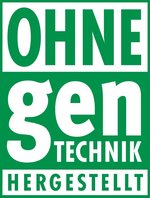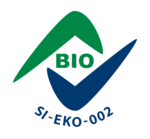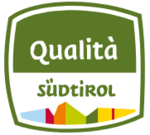Non-GMO Production in Europe
Non-GMO Labelling
Any non-GMO labelling must comply with strict requirements. The entire food and feed production process is checked to ensure the absence of GMOs – from seed to cultivation on the fields to processing and all the way to packaging, including the correct use of the non-GMO label. External monitoring and certification bodies, as well as national food and feed control authorities, ensure that all labelled non-GMO products fully comply with the requirements related to non-use of GMOs, from seed to final product.
The non-GMO claim closes the labelling gap in EU GMO legislation. Currently, only genetically engineered feed is subject to GMO labelling, but not their related food products, e.g. milk, meat and eggs. Substantial amounts of genetically engineered soybean, oilseed rape and maize are imported for feed production.
As long as the European legislator does not introduce a “with GMO” labelling for food derived from GM feed – and there is no sign of this happening – only non-GMO labelling offers freedom of choice and full transparency for consumers in the animal product segment.
Non-GMO products support consumers in their preference for GMO-free agriculture and GMO-free food.
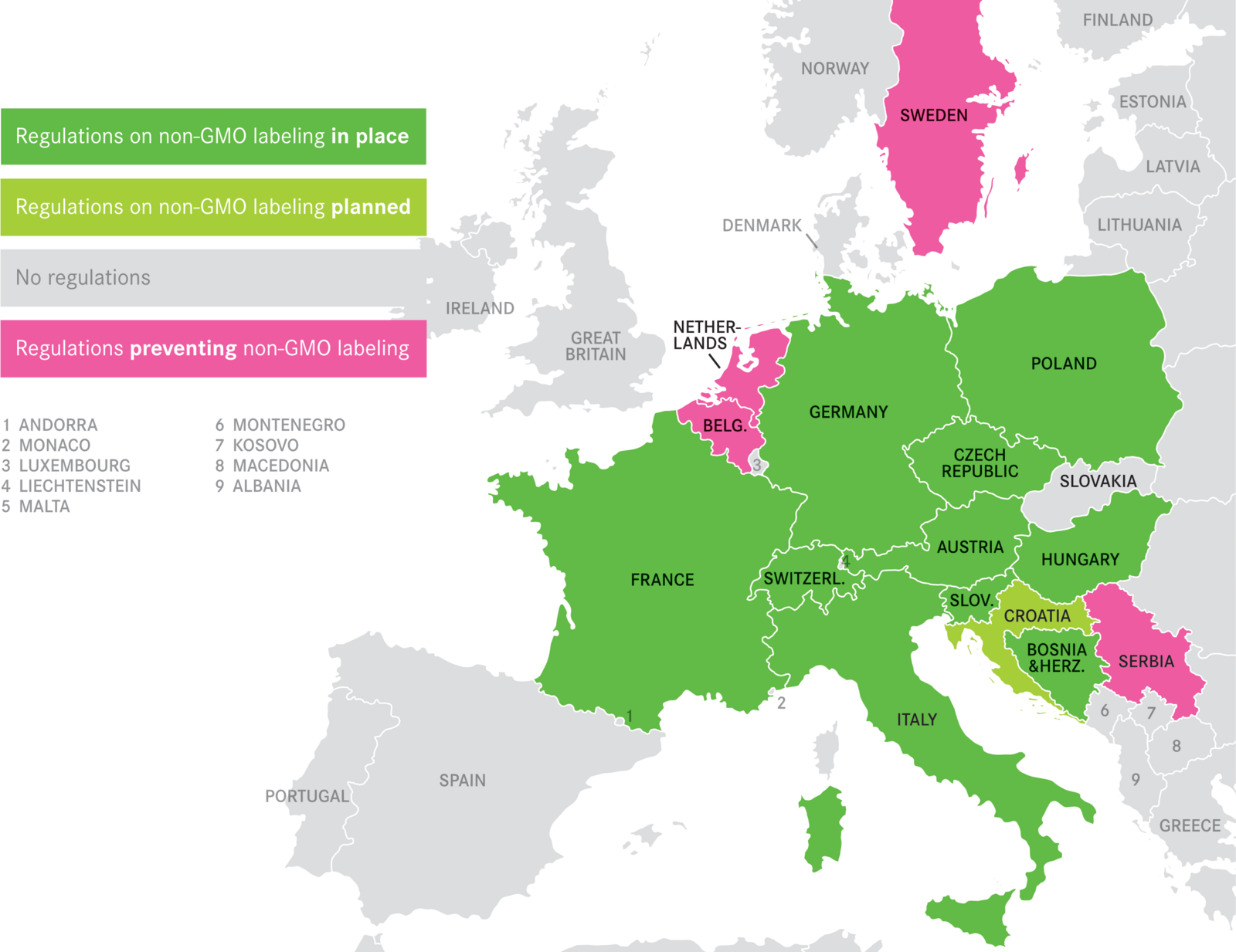
The Non-GMO Sector in Europe
Since GMOs were introduced to EU markets in 1996 a significant number of European consumers have explicitly and repeatedly stated that they do not want GMOs anywhere in their food chain. Many European supermarkets do not want to sell food made with GMOs. Consequently, it is rare to see labelled GMO products on European supermarket shelves. Instead, the rapidly growing range of products labelled as non-GMO has already turned into a strong and successful business segment.
Non-GMO production has developed into a well-established quality standard in many European countries: at present in Austria, France, Germany, Slovenia, Italy, Hungary, Poland, the Czech Republic, Switzerland and Bosnia-Herzegovina laws or industry agreements are in force that regulate non-GMO labelling on a voluntary basis. In other countries efforts are underway to introduce a non-GMO labelling system.
In addition, the European organic sector is working entirely "without genetic engineering". This is defined in the EU Organic Regulation as well as in national organic standards. In some European markets this is communicated to consumers with a non-GMO label in addition to the organic label.
Labelling Platforms
The Austrian association ARGE Gentechnik-frei (Platform for GMO-free Food Production) was founded in 1997. ARGE Gentechnik-frei represents more than 190 companies and facilitates, promotes and supports GMO-free production in Austria (food, feed and agricultural products). It awards the label “Ohne Gentechnik hergestellt” (produced without GMOs). Its members’ non-GMO production output generates an annual turnover of approximately 2.5 billion euros, with more than 6,500 labelled products. In Austria the entire milk and egg production (since 2010) and all poultry (since 2012) are “non-GMO”. Ninety-five percent of Austrian retailers proactively support non-GMO products and are members of ARGE Gentechnik-frei.
www.gentechnikfrei.at
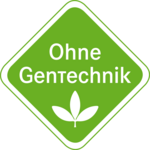
The German Association Verband Lebensmittel ohne Gentechnik (VLOG; Association Food without Genetic Engineering) was founded in 2010. VLOG represents 750 companies, food manufacturers and retailers as well as the upstream and downstream areas of food production. It grants licenses for the state-owned seal "Ohne GenTechnik" (without genetic engineering) for food produced according its standards and the seal "VLOG geprüft" (verified by VLOG) for animal feed. In 2019 the member companies of VLOG generated 8.8 billion euros in sales with more than 14,500 labelled non-GMO products, which corresponds to 11.3 billion euros in consumer spending. In Germany 60 % of milk, 60 % of poultry meat and 70 % of eggs are produced "non-GMO".
www.ohnegentechnik.org
Donau Soja, founded in 2012, is a European non-profit organisation with more than 290 members from all sectors of the value chain (from farm to fork) as well as civil society organisations.
Donau Soja is open to all interested companies, (industry) associations, institutions and individuals that are interested in using and/or producing, processing, marketing or supporting non-GM produced and origin-controlled soya. The goal of the association is to make a significant contribution to the development of agricultural systems by promoting the sustainable cultivation and use of soybeans in Europe to secure and guarantee GMO free supplies of soya. Donau Soja supports a healthy environment and healthy diets while aiding the development of non-GMO value chains.
Donau Soja provides quality standards and respective product labels for the exemplary production, processing, control and traceability of European sustainable non-GMO soya from the Danube region and Europe. Donau Soja was heavily involved in the development of the non-GMO Danube Region standard and is providing a non-GMO label for companies that produce according to its standards
https://www.donausoja.org/en/home/
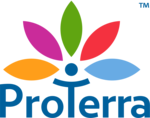
ProTerra Foundation is a not-for-profit organisation that advances and promotes sustainability at all levels of the feed and food production system. A commitment to full transparency and traceability throughout the supply chain and concern for corporate social responsibility and the potential detrimental impact of herbicide-resistant, genetically modified crops on ecosystems and biodiversity is at the heart of everything we do.
Independent third party certification is central to the ProTerra Foundation and brings together stakeholders from all parts of the supply chain. ProTerra certification ensures that high quality supplies of crops, food, and feed, that are independently certified as Non-GMO and produced with improved sustainability, are available in the market.
https://www.proterrafoundation.org/
The Slovenian IKC Inštitut za kontrolo in certifikacijo UM registered and implemented a private non-GMO certification in Slovenia in 2011. It grants licenses for the seal "Pridelano/proizvedeno brez GSO – brez gensko spremenjenih organizmov" (produced/processed without GMO – without genetically modified organisms) and non-GMO animal feed. In 2019 certified producers and processors labelled more than 650 non-GMO products. All Slovenian feed mills take part in the certification process to deliver non-GMO feed to certified producers. In Slovenia a significant portion of the milk and egg and poultry supply comes from non-GMO production. Non-GMO production is also very important for family farms with small processing units who sell their products to local markets and public institutions (such as schools, kindergartens…).
https://www.ikc-um.si/ikc-um/
The Italian Sennereiverband Südtirol / Federazione Latterie Alto Adige awards the South Tyrolean Seal of Quality. It guarantees high-quality milk and milk products free of genetic engineering and promotes species-appropriate animal husbandry.
www.altoadigelatte.com/
ARGE Gentechnik-frei, VLOG, Donau Soja and IKC Inštitut za kontrolo in certifikacijo UM have member companies in Austria, Germany, Slovenia, Poland, the Netherlands, Belgium, Denmark, the Czech Republic, Spain, Italy, Luxembourg, Hungary, Lithuania, Slovakia, Slovenia, Greece, France, Romania and in non-EU countries, including Norway, Switzerland, Serbia, Bosnia-Herzegovina, Moldova, Ukraine, Russia and Great Britain. Members of Sennereiverband Südtirol are based in South Tyrol.
